At this point, buying property in Turkey is hardly a new idea. It’s been a favorite spot for different kinds of investors, thanks to the weather, location, and a relatively neutral geopolitical status. But, as with all good things, the market couldn’t keep climbing forever. Turkish real estate market hit a peak in 2023, and now we are witnessing a cooldown. So, what’s next? Let’s cut through the noise and figure out how you can still make smart moves in Turkish real estate.
Key Findings:
- Prices in Dollars Have Dropped: While property prices in Turkey surged in 2023, inflation-adjusted real values have actually fallen. This opens up opportunities for investors who can spot long-term potential.
- Falling Demand Creates Opportunity: Home sales have dropped sharply, both domestically and internationally. Fewer buyers mean less competition for high-quality properties, giving savvy investors an edge.
- On the Path to Energy Independence: Turkey’s discovery of Black Sea natural gas reserves promises to reduce energy imports and stabilize the economy, setting the stage for stronger long-term real estate growth.
- Tourism Keeps the Rental Market Strong: Cities like Istanbul and Antalya continue to draw millions of tourists, sustaining a healthy rental market and providing reliable returns for short-term rental investors.
- Now’s the Best Time to Invest: With the real estate bubble bursting in 2023, prices have cooled, making this the perfect moment to invest before the next growth wave hits.
Turkish Lira’s Inflation Ride: From Relief to Burden
Let’s start by reviewing the situation regarding the Turkish lira. The lira’s performance shapes almost every aspect of the economy, from inflation to purchasing power, and most importantly, it directly influences the local real estate market. The national currency’s dramatic slide in recent years has been one of the biggest stories in the Turkish economy, with inflation averaging an eye-watering around 60% from 2022 to early 2024. Although the government has started to address the inflation problem, and the inflation eased to 51.97% as of August 2024, the impact of these wild price swings will be felt for a long time to come.
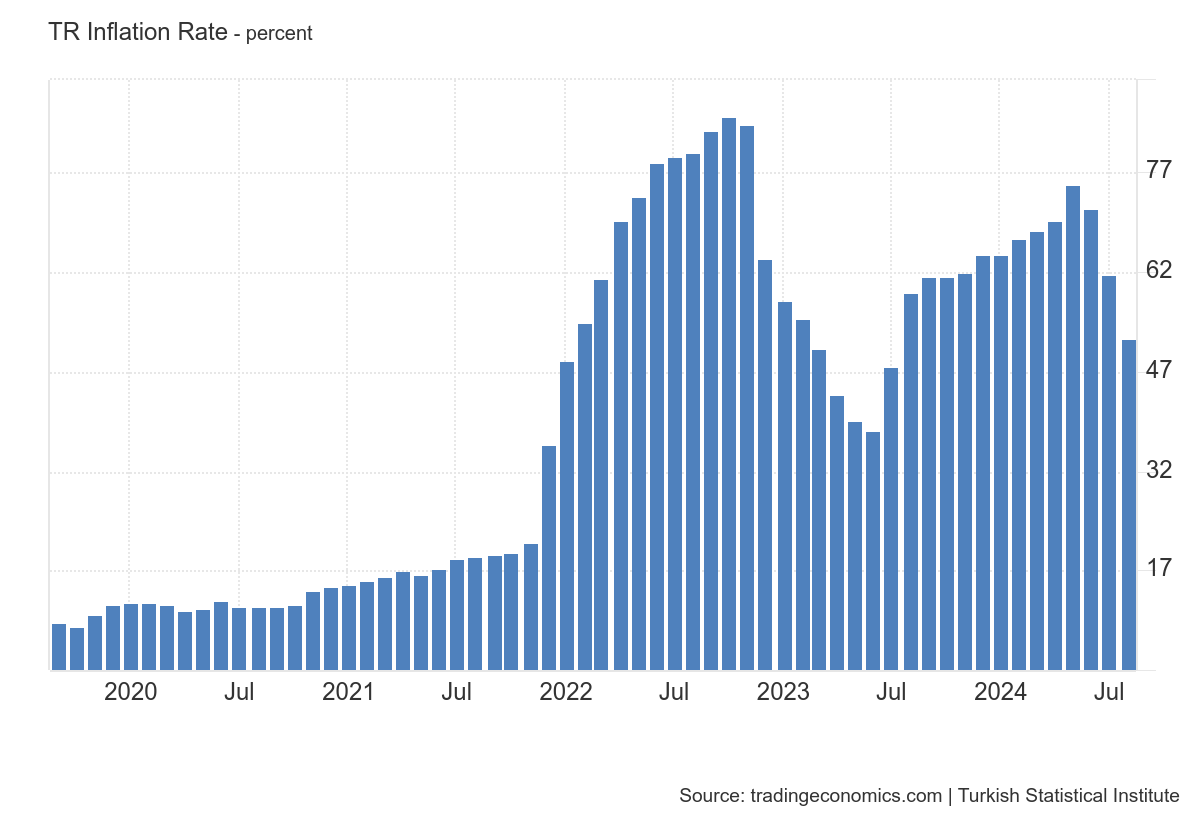
What caused this inflationary storm? In part, it was the result of unorthodox economic policies, with Turkey’s central bank cutting interest rates at a time when most countries would have raised them to tame inflation. This fueled the lira’s downward spiral, making imports more expensive, particularly energy, which Turkey relies heavily on. Initially, real estate seemed like a safe haven as property prices shot up. But as inflation kept rising, so did costs across the board—making housing less affordable for locals and squeezing the broader economy.
In June 2023, the Central Bank of the Republic of Turkey (CBRT) reversed course, aggressively hiking rates to rein in inflation and stabilize the lira. Over the year, the rate has been increased from 8.5% to 50%. While this has provided some relief, the damage from years of inflation has left a mark, and inflation isn’t cooling as fast as expected. Also, higher interest rates now mean borrowing is more expensive, which dampens domestic demand for real estate. However, foreign buyers may still find opportunities as property prices—though inflated in lira—remain competitive in dollar or euro terms. Will the Turkish authorities be able to find a balance between curbing inflation and encouraging investment? This will determine the Turkish real estate market in the coming years.
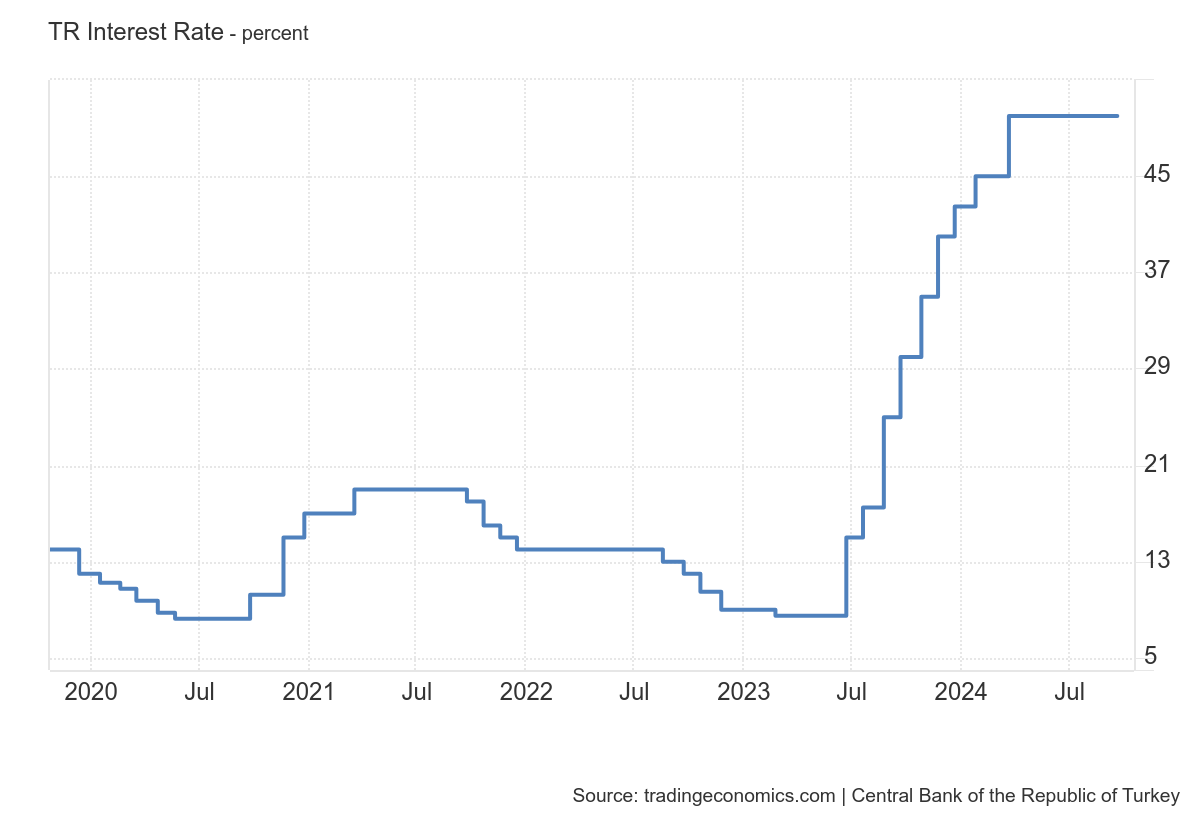
Real Estate Prices in Turkey: Nominal vs Real Value
Real estate prices in Turkey have seen significant nominal growth in recent years. By May 2024, nationwide house prices had jumped by 42% year-over-year. This follows sharp increases in previous years, with nominal prices rising 71.7% in 2023 and a staggering 178.6% in 2022. Istanbul saw a 31.6% year-over-year increase, Izmir faced 43.3%, and Ankara skyrocketed by 52.6%. However, these numbers paint a very different picture when inflation is factored in.

When adjusted for Turkey’s high inflation, real property prices tell a different story. Nationally, real house prices actually fell by 19% in the year to May 2024, reaching an average of $999 per square meter. In Istanbul, prices dropped by 25%, while Ankara saw a 13% decline, and Izmir experienced an 18.3% drop. The trend is true for both new and existing properties. This gap between nominal and real values highlights the impact of inflation on the Turkish property market.

Real Estate Demand in Turkey: House Sales Are Dropping
Turkey’s real estate market has seen a sharp decline in demand, both domestically and internationally. In 2023, total home sales fell by 17.5%, with 1.23 million units sold. Major cities like Istanbul and Izmir were hit particularly hard, with home sales dropping by 23.5% and 21.6%, respectively. Ankara, despite its smaller decline of 9.3%, also reflects the overall cooling. Higher mortgage rates and inflation have made it difficult for locals to buy, and the trend continues into 2024, with a further 3.7% drop in sales during the first half of the year.

The drop in foreign investment has been even more dramatic. In 2023, foreign home purchases fell by 48.1%, with just 35,005 units sold, compared to 67,490 the year before. By mid-2024, the downward trend persisted, with foreign purchases falling another 45.7%. Rising prices and economic volatility have driven many international buyers away, shrinking their market share to under 3%, down from 4.5% in 2022. This sharp decline comes after several years of consistent growth in foreign investment, especially from countries like Russia, Iran, and Iraq.
Turkey’s Economic Future: Growth and Challenges
Turkey’s economy has been on a wild ride, yet it continues to show resilience. After expanding by 4.5% in 2023, following annual expansions of 5.5% in 2022, 11.4% in 2021, and 1.9% in 2020, the International Monetary Fund (IMF) projects a 3.6% growth for 2024. Remarkably, even with the Central Bank’s interest rate sitting at 50%, the economy hasn’t fallen into recession and continues to grow at a decent pace.
Sure, high interest rates have made mortgages costly for locals, which has slowed domestic demand for property purchases. But this could lead to a surge in the rental market as fewer people buy homes. Higher borrowing costs also pressure developers and slow down new construction. However, if these rates manage to stabilize the lira and curb inflation, confidence among all parties could be restored. A stronger and more stable lira would boost local buyers' purchasing power, possibly reigniting demand and competition. If rate hikes stick around and fiscal policies stay smart, Turkey’s real estate market could find itself on more stable ground.
Energy Hub Between East and West: Path to Self-sustainability
One major piece of Turkey’s economic puzzle is its reliance on foreign debt, especially in the private sector, which holds debt equivalent to 20% of GDP. Much of this is denominated in dollars and euros, which makes the country vulnerable to currency fluctuations. However, the bigger driver of Turkey’s persistent current account deficit is energy. That is why Turkey’s path to economic stability is closely tied to energy.

For years, the country relied on imports, but recent developments are shifting the picture. Turkey has discovered 710 billion cubic meters of natural gas in the Black Sea, which represents around 15 to 20 years of domestic consumption. The first phase of production kicked off in April 2023, and ongoing exploration is likely to uncover more reserves. This discovery not only reduces the need for foreign energy but strengthens Turkey’s role as a transit energy hub between East and West, controlling key pipelines. By stabilizing its energy supply, Turkey can lower its account deficit and tackle one of the key drivers of inflation, paving the way for sustained economic stability and growth.

Turkey’s Tourism Surge: A Resilient Cornerstone of the Economy
Unlike real estate, Turkey’s booming tourism sector has largely been unaffected by the country’s inflation and currency turbulence. In August 2024 alone, 6.8 million foreign tourists visited, marking a 2.47% year-on-year increase. The surge in tourism has been driven by growing numbers from countries like Russia, the United Kingdom, Iran, and Poland. In the first eight months of 2024, a total of 35.8 million tourists arrived, reflecting a 7.11% rise from the previous year. Turkey has solidified its position as a go-to destination, with international travel bouncing back close to pre-pandemic levels.

Istanbul and Antalya stand out among the most visited cities in the world, drawing millions of international tourists each year. In 2023, Istanbul saw a 26% rise in international arrivals, topping the global list of most-visited cities. With its rich history and vibrant culture, the city continues to be a major draw for travelers. Meanwhile, Antalya—a smaller city on the Turkish Riviera—welcomed 16.5 million international visitors, more than larger cities like Paris, New York, and Bangkok. This 29% surge from the previous year highlights Antalya’s growing appeal, particularly among Russian, British, and German tourists who flock to its sunny beaches and resorts.

But it’s not just coastal destinations that are thriving. Additionally, Turkey’s medical tourism industry is booming, with over 1.2 million people visiting in 2022 for medical treatments, and 746,290 more arriving in just the first half of 2023. Antalya has even become a hotspot for dental tourism, with many clinics offering all-inclusive packages that cover travel and accommodations. Tourism remains one of Turkey’s most resilient and growing sectors, helping to buffer the economy against other challenges.
Key Investment Hotspots in Turkey: Cities and Regions to Watch
It's clear that certain regions offer more promising opportunities than others. Let’s dive into five key locations that have consistently attracted both domestic and international investors. Whether you’re after rental income, long-term growth, or a second home, these hotspots can provide whatever you need.
Istanbul: The Beating Heart of Turkey’s Economy

Istanbul is Turkey's largest city and economic hub, offering a mix of luxury and affordable housing. Areas like Beyoğlu and Sultanahmet attract high-end buyers while developing districts such as Ataşehir and Başakşehir offer growth potential thanks to infrastructure projects like the metro and the new airport. The city's rental market is driven by a constant flow of international professionals and students.
- Average Rental Yields: 6.63%
- Average price per square meter: $1,204
Ankara: Stability in the Capital
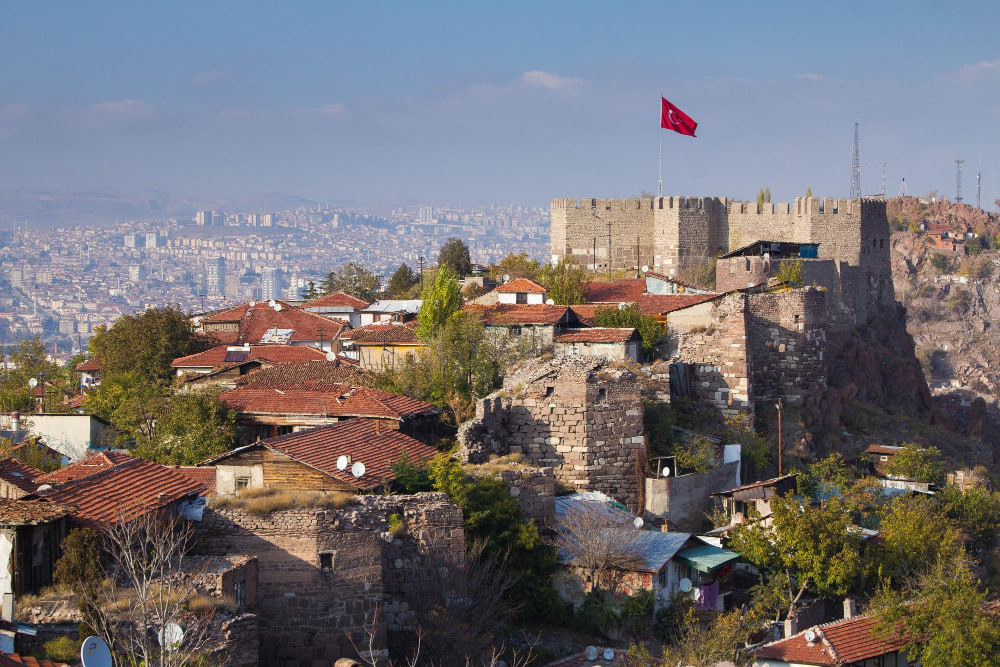
Ankara, Turkey’s capital, offers a more stable and affordable real estate market compared to Istanbul. Key areas like Çankaya, Oran, and İncek are popular among expatriates and diplomats due to their proximity to embassies and government institutions. The city’s quieter environment and lower prices make it an attractive option for investors seeking steady returns.
- Average Rental Yields: 8.19%
- Average price per square meter: $827
Antalya: Touristic Delight

Antalya, Turkey’s top tourist destination, sees strong demand for vacation rentals, especially in modern residential complexes with amenities like pools and fitness centers. Foreign buyers, particularly from Russia, the UK, and Germany, are drawn to Antalya’s Mediterranean coast, boosting the demand for both short-term rentals and second homes.
- Average Rental Yields: 5.17%
- Average price per square meter: $1,195
Izmir: Pearl of the Aegean
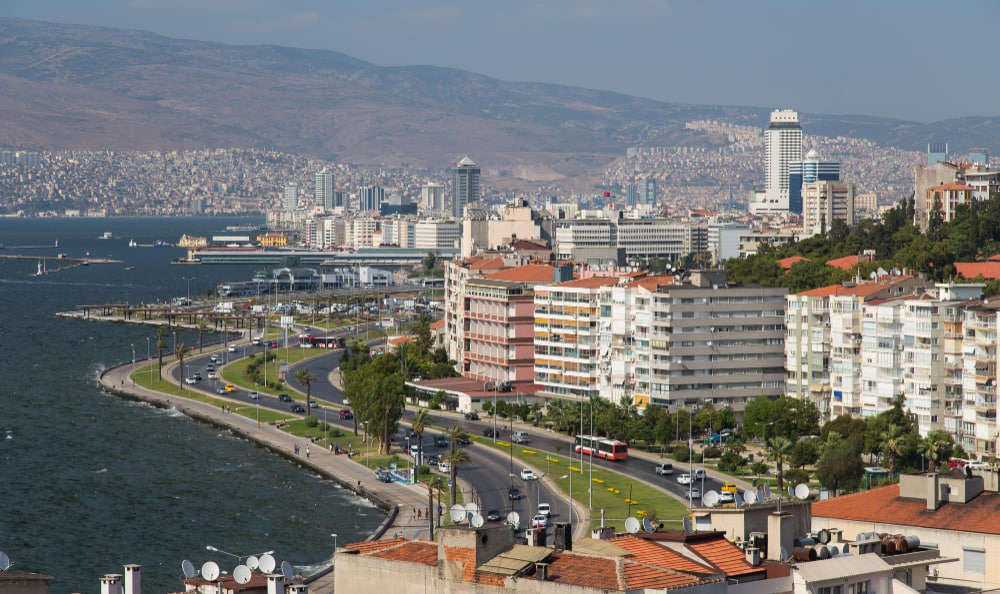
Izmir, located on the Aegean coast, offers a mix of residential and luxury properties, with areas like Karşıyaka and Alsancak popular among families and expatriates. The upscale district of Çeşme is known for its luxury villas, attracting high-end buyers. Izmir’s appeal to tourists makes it an excellent choice for seasonal rental investments.
- Average Rental Yields: 7.22%
- Average price per square meter: $1,185
Alanya: Treasure on the Turkish Riviera
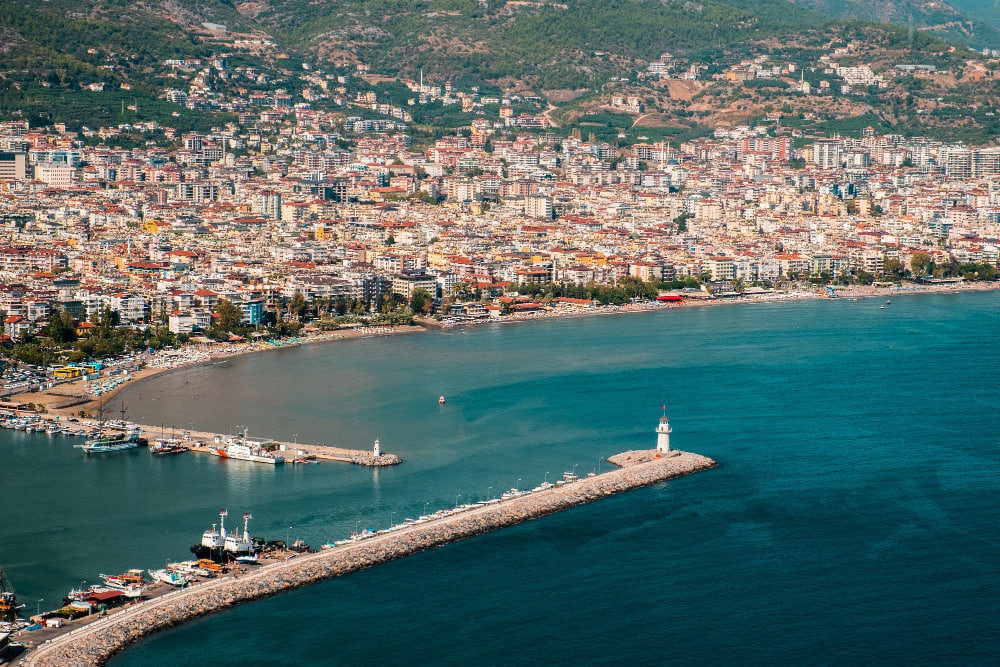
Alanya is a popular choice for first-time buyers, thanks to its affordable prices and steady demand for holiday rentals. Its Mediterranean climate and long beaches attract a multicultural population, with many European residents. The city's stable real estate market makes it a low-risk, high-demand location for vacation homes.
- Average Rental Yields: 5.15%
- Average price per square meter: $751
Acquiring Turkish Real Estate as a Foreigner: Reasons and Tips
Turkey has become an attractive real estate destination for foreign investors after the reciprocity rules were abolished in 2012. That has allowed nationals from 183 countries to purchase properties. The combination of affordable property prices, potential for high returns, and incentives like the Turkish Citizenship by Investment program has drawn buyers from various countries around. The falling Turkish lira has made these investments even more appealing.
The financial and real estate markets are growing bubbles, and Turkey is no exception. At some point, excitement inflates a market bubble, and eventually, it bursts. This is a normal part of the cycle, and the key is not entering just before the bubble pops. In 2023, the Turkish real estate bubble seems to have burst, leading to a market cooldown. This cooling-off period presents the best opportunity to get in. Entering the market right after prices have dropped and stabilized is often the most advantageous time, offering strong growth potential as the market begins its recovery.
Tips for Foreign Real Estate Investors in Turkey:
- Focus on the Secondary Market: While many new developments can be overpriced, buying secondhand properties in thriving neighborhoods offers better opportunities for value appreciation. Consider renovating properties to Western standards for higher yields and capital gains.
- Look for Up-and-Coming Areas: Instead of buying in prime locations, consider neighborhoods close to high-end areas that are undergoing gentrification. These locations offer better potential for capital appreciation.
- Take Advantage of Citizenship Programs: If you’re looking to establish residency or citizenship, consider purchasing property worth at least $400,000 to qualify for Turkey’s Citizenship by Investment program. This also adds potential resale value as other foreigners may look to buy citizenship-qualifying properties in the future.
- Understand Local Market Trends: To make smarter investment choices, think like a local. Study the local market, paying attention to areas with ongoing infrastructure developments, as these will likely see the highest growth in value.
How to Mitigate Earthquake Risks?
Turkey is a highly seismic region, sitting on several active fault lines, which makes earthquake risks a real concern for property investors. To mitigate these risks, the first step is to look at a seismic map and basically avoid areas marked in dark red, that indicate higher earthquake activity. Legally, all homeowners must have earthquake insurance, providing some coverage in case disaster strikes.

Building quality plays a huge role in safety – earthquakes obviously tend to affect poorly constructed buildings the most. Newer properties don’t always guarantee better quality, as developers sometimes cut corners. In some cases, older, well-constructed buildings are the safer bet. Ultimately, you need to assess each building individually, considering both age and structural integrity.
How to Avoid Overpricing?
In Turkey's dynamic real estate market, overpricing can be a common pitfall, especially in popular areas like Istanbul or Antalya where demand has historically driven prices up. With Turkish lira fluctuations and constant repricing, it’s crucial for investors to be cautious. While new developments might seem appealing, many are overpriced due to the developer’s marketing or location hype. Here are some tips to avoid overpaying:
- Research Market Comparisons: Check recent sales data for comparable properties in the same neighborhood to ensure the price matches the market rate.
- Consult a Local Expert: A trusted local real estate agent can offer valuable insights into which properties are genuinely worth the asking price.
- Avoid High-Profile New Developments: Often, newer buildings are heavily marketed, leading to inflated prices. Look for less-publicized options that offer similar amenities at a lower cost.
- Consider Renovation Opportunities: Secondhand properties in good locations may be undervalued. A well-done renovation could increase the property’s value without the initial overpricing.
- Be Patient: Wait for the right deal instead of jumping into a market that may still be cooling off.
Three Case Studies: Istanbul Renovation, Alanya Construction, and Antalya Rental Yield
Turkey’s real estate market offers a variety of investment opportunities. Here, we explore three specific case studies to demonstrate how investors can maximize returns through different strategies.
1. Istanbul Renovation Case Study: Beyoğlu Apartment
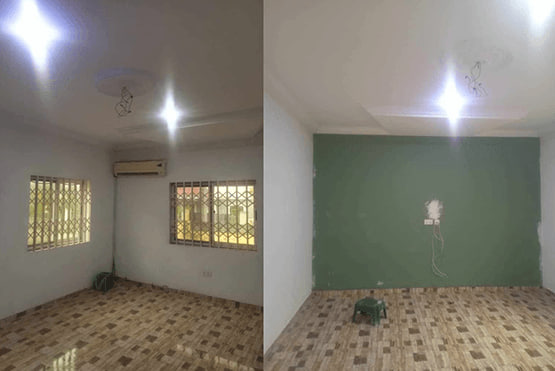
Beyoğlu, located near the heart of Istanbul, is an attractive location for real estate renovation projects. Known for its historical charm and proximity to tourist attractions, this district is ideal for those looking to refurbish and rent out properties to locals and tourists alike. With a growing demand for short-term rentals and relatively low initial costs for older properties, renovating in Beyoğlu can yield significant returns.
- Investment Example: A two-bedroom apartment in need of renovation, purchased for $150,000.
- Renovation Costs: $40,000 for updating to modern standards.
- Post-Renovation Market Value: $220,000 (a 20% increase in value).
- Projected ROI: Around 25% after the renovation.
- Projected Rental Income: $1,800 per month, with potential for higher earnings in tourist-heavy seasons.
2. Alanya Construction Case Study: Seaside Villa

Alanya, on the Mediterranean coast, is a growing destination for property investments, particularly in new construction. With an influx of international buyers seeking vacation homes, the demand for modern residential complexes and villas continues to rise. Construction projects in Alanya benefit from lower upfront costs compared to major cities and appeal to those seeking both long-term appreciation and rental income.
- Investment Example: A 3-bedroom villa in a developing seaside neighborhood, purchased off-plan for $200,000.
- Construction Timeline: 18 months.
- Post-Completion Market Value: $280,000 (a 40% increase in value).
- Projected Rental Income: $1,500 per month during off-peak seasons, and $3,000 per month during peak tourist months.
- Projected ROI: Around 20% once construction is completed, with additional rental income opportunities.
3. Antalya Tokenized Rental Yield Case Study: Hayat Green Tower on Binaryx Platform
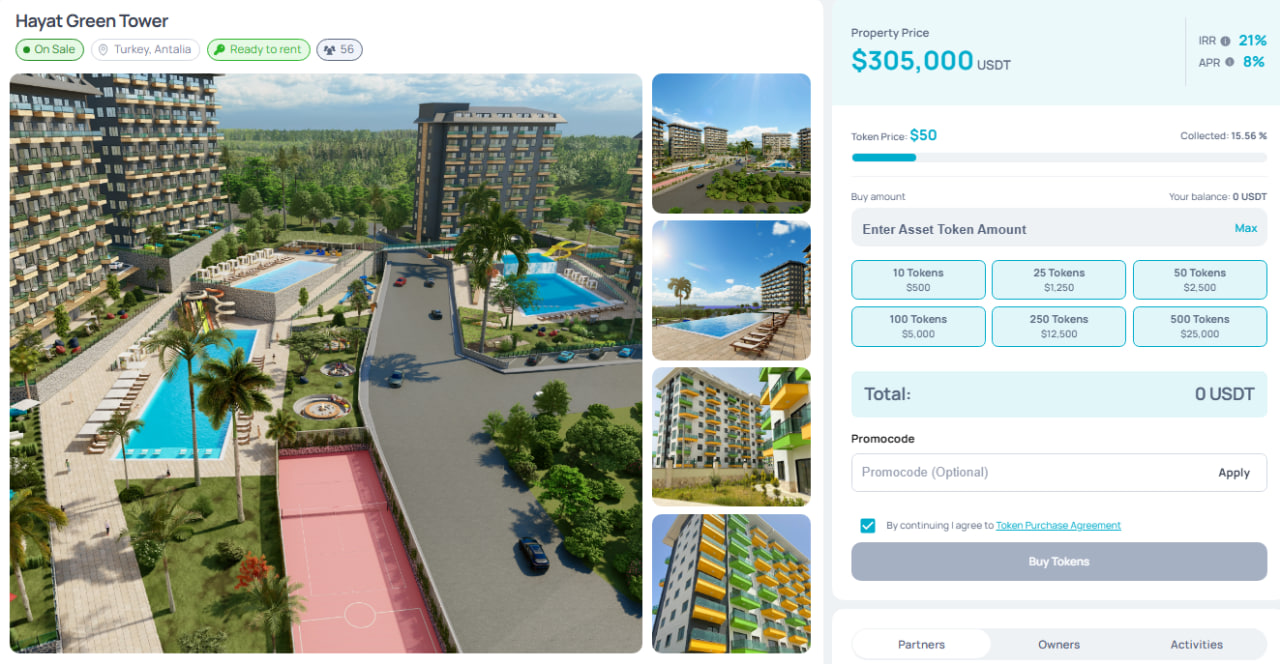
Antalya is renowned for its booming tourism industry, making it a prime location for right-away rental yield. Tokenization platforms like Binaryx offer a modern approach to property investment, allowing you to buy shares of high-value properties starting at just $500. Hayat Green Tower in Antalya, located near the scenic Incekum Beach, is an ideal example of how tokenization works. Binaryx uses Polygon blockchain technology and the Wyoming DAO LLC Act to create an LLC that owns the property. You can buy digital tokens that represent fractional ownership, benefiting from rental income and property appreciation without the hassle of direct property management.
- Investment Example: Purchase of 400 property tokens for $20,000.
- Guaranteed Return: 8% per year for the first two years.
- Projected ROI: $1,600 annually from guaranteed returns, with potential for increased rental income as demand grows.
Conclusion
Turkey’s real estate market may have cooled off, but that’s not necessarily a bad thing. In fact, this is exactly the moment to take a closer look. The lira’s rollercoaster ride, skyrocketing inflation, and the eventual correction have created opportunities that didn’t exist when the market was overheated. Now, with prices stabilizing and inflation starting to ease, this could be the perfect time to get in before the next wave of growth.
That said, Turkey’s real estate market isn’t without its challenges—earthquake risks, overpricing traps, and a still-fragile economy mean that due diligence is more important than ever. But for those who can navigate these complexities, Turkey offers something few other markets can: the potential for strong returns in an increasingly global and dynamic property market. And if you don't want to deal with the challenges on your own but just want a constant, stable income from the Turkish market, then Binaryx is your solution.

Articles you may be interested in



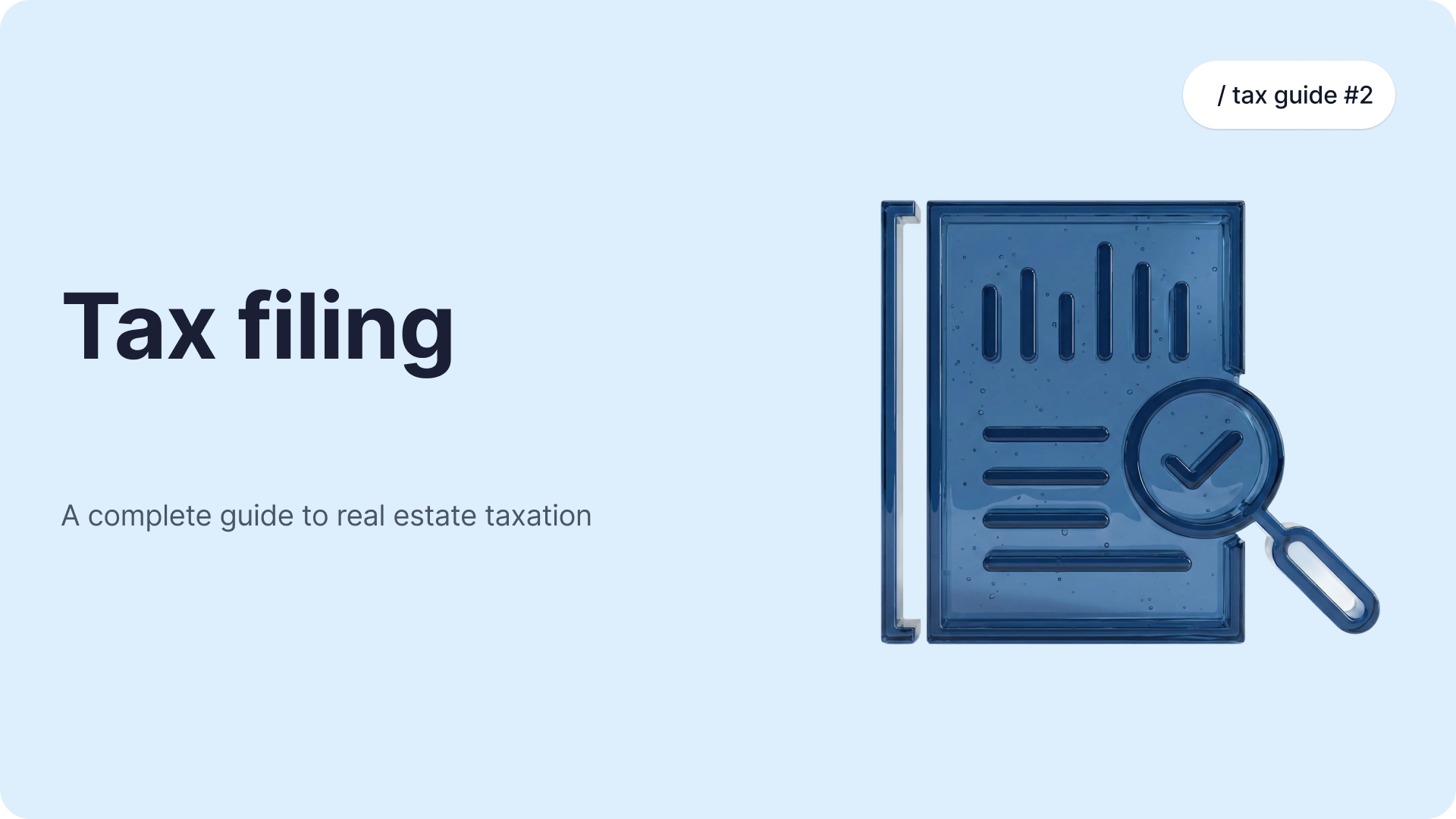
.png)



.png)



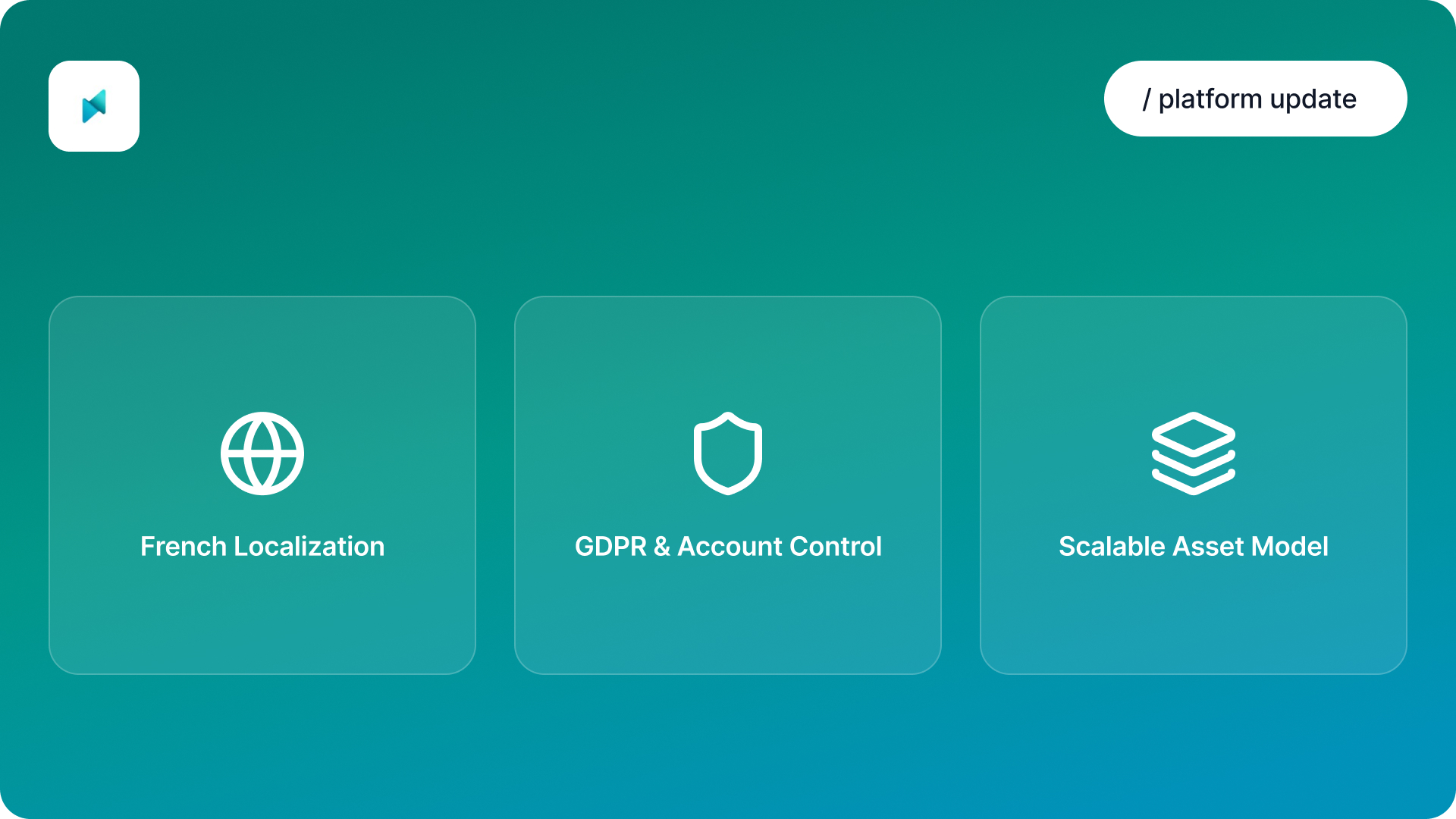
.jpeg)
.webp)